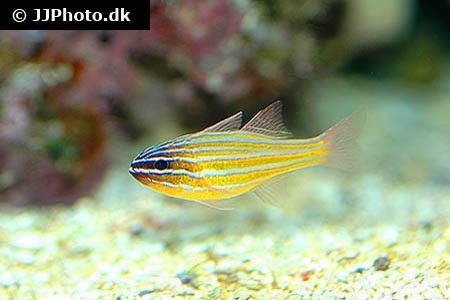Ostorhinchus cyanosoma

| Latin name | Ostorhinchus cyanosoma - (Bleeker, 1853) |
|---|---|
| Local name | Yellowstriped Cardinalfish |
| Family | Apogonidae - Ostorhinchus |
| Origin | East Indian Ocean, West Indian Ocean, Australia, Japan, The Red Sea, Indonesia, East Pacific, Central/West Pacific |
| Max length | 7 cm (2.8") |
| Minimum volume |
100 l (26 gal) |
|---|---|
| Hardiness |
Hardy |
| Suitable for aquarium |
Suitable for most aquarium |
| Reef safe |
Always reef safe |
| Aggressiveness | Peaceful |
| Recommended |
Small crustaceans (Krill, mysis, artemia...) Zooplankton (Cyclops, pods...) |
|---|
This species can be a threat towards small crustaceans, e.g. small shrimp.
This species needs good hiding places, for example, between live rocks.
This species can sometimes be found hiding between anemones or similar.
This species, on occasion, likes to hide in the spines of Diadema sea urchins.
Species are sometimes reclassified. This species was formerly classified as a member of the Apogon genus.
Several specimen of this species can coexist in the same aquarium, provided they are introduced simultaneously.
This species belongs to what is known as the Cyanosoma complex, which consists of, all in all five similar species.
Ostorhinchus cyanosoma
Ostorhinchus luteus
Ostorhinchus properupta
Ostorhinchus ribrimacula
Ostorhinchus wassinki
The classification of these species are still debated.
Cardinalfish come in many different shapes and colours, generally they are well suited for aquaria.
Cardinalfish have a large mouth and a big appetite, take this into account with feeding the other fish. These fish typically live off of Artemia, Mysis and krill. In the aquarium they will eat anything they can.
They will sometimes eat small shrimps and fish, so do be aware of this, but it is not normally a problem.
It is possible to keep several species together, if space allows. Some species will form small shoals. They are normally peaceful towards other fish, but will sometimes fight among themselves if there isn't sufficient space or food.
Many species are nocturnal and will therefore often seek a hiding place during the day. This can be between stones, SPS corals and, in some cases, in an anemone and between spines of Sea urchins.
Cardinalfish are a good choice if ones wishes to attempt to start a breeding tank.
| Aquarium trade | Yes |
|---|---|
| Distribution | Indo-Pacific: Red Sea south to Mozambique and east to Fiji, north to the Ryukyu and Bonin islands, south to New Caledonia. Recently recorded from Tonga (Ref. 53797). |
| English common names |
Yellow cardinalfish Yellow-striped cardinalfish Goldenstriped cardinalfish Orange-lined cardinalfish Orangelined cardinalfish |
| Danish common names |
Gulstribet kardinalfisk |
| French common names |
Apogon à rayures jaunes |
Scott W. Michael. 2001. Basslets, Dottybacks & Hawkfishes: v. 2 (Reef Fishes) - TFH Publications / Microcosm Ltd. - (English)
Bob Fenner. Cardinalfishes, Family Apogonidae, Pt. 1, Pt. 2 - Wet Web Media - (English)

